广州中考英语必考语法
广州中考英语知识点

广州中考英语知识点1.词汇知识:
-同义词和反义词
-常见的前缀和后缀
-常用短语和固定搭配
-高频词汇
2.语法知识:
-时态和语态
-代词和冠词的用法
-名词、动词、形容词和副词的用法
-句子的基本结构和主谓一致
3.阅读理解:
-根据文章中的信息回答问题
-阅读并理解图表、图画和提示
-推理出文章中的隐含信息
-对短文的观点进行分析和评价
4.写作技巧:
-书信写作
-日记和记叙文写作
-描述事件、人物和地点
-写出自己的观点和建议
下面是对每个知识点的详细介绍:
1.词汇知识:
词汇知识是英语考试中的基础,包括了各种词汇的理解和使用。
学生需要学习一些同义词和反义词以及词汇的构成规则。
此外,还需要了解一些常用短语和固定搭配。
2.语法知识:
语法知识是进行句子构造和理解的基础。
学生需要了解各种时态和语态的构成,以及代词、冠词、名词、动词、形容词和副词的用法。
此外,还需要掌握句子的基本结构和主谓一致。
3.阅读理解:
阅读理解是考察学生理解和分析能力的重要环节。
学生需要根据文章中的信息回答问题,理解和解释图表、图画和提示,推理出文章中的隐含信息,对短文的观点进行分析和评价。
4.写作技巧:
写作技巧是考察学生表达能力的重要环节。
学生需要学习书信写作、日记和记叙文写作,以及描述事件、人物和地点的技巧。
同时,学生还需要学会表达自己的观点和建议。
2024年广东省中考英语总复习名词课件

序号
构成方法
示例
表示“各自拥有”时,各自 4
加’s,后跟名词的复数
Lucy’s and Lily’s rooms are very big.露西和莉莉各自的房 间都很大。
表示“某人家”、“某种从业 at Mr.White’s (house) 在怀
者的工作地点(如:店铺、诊 特先生家; 5
所、餐馆等)”时,一般省略 at the doctor’s (clinic) 在诊
(土壤);sand(沙子)
抽象名 词
love ; knowledge ; laughter ; trouble ; happiness ; honesty ; fun ; confidence ; progress ; advice ; pleasure ; health;spirit
history;art;music;English;maths;physics;science; 学科
名词所有格后面的名词
所
序号
构成方法
示例
today’s newspaper 今 天 的 报 有些表示时间、距离、国家、
纸;ten minutes’ walk 步行十 6 城镇、机构的名词后面也可
分钟的路程;China’s industry 加’s表示所有格
6.由两个名词组成的复合名词变复数时,常把最后一个名词变复数。
但第一个名词若是man或者woman,两个名词都要变复数。如:
an apple tree→two apple trees
a woman doctor→two women
doctors
7.可数名词“量”的表达方法
(1)与不定冠词a/an或基数词连用,如:
4.有些词的形式为复数,但意义为单数,作主语时谓语动词用单数形 式。如:新(新闻news)、政(政治politics)、数(数学maths)、 物(物理physics)等。如: Is maths your favorite subject?数学是你最喜欢的科目吗? Tip: 复数形式表示特殊含义。如:times时代;drinks饮料;waters水 域;woods森林。
【精品】广州中考英语10大语法选择必考知识点
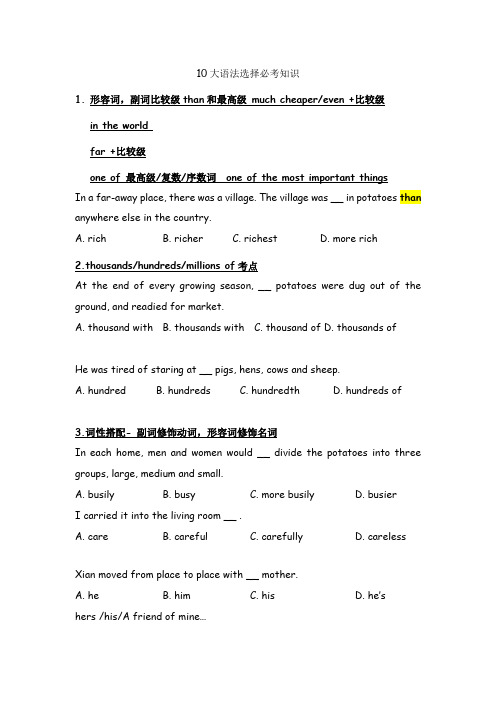
10大语法选择必考知识1.形容词,副词比较级than和最高级 much cheaper/even +比较级in the worldfar +比较级one of 最高级/复数/序数词 one of the most important thingsIn a far-away place, there was a village. The village was __ in potatoes than anywhere else in the country.A. richB. richerC. richestD. more rich2.thousands/hundreds/millions of考点At the end of every growing season, __ potatoes were dug out of the ground, and readied for market.A. thousand withB. thousands withC. thousand ofD. thousands ofHe was tired of staring at __ pigs, hens, cows and sheep.A. hundredB. hundredsC. hundredthD. hundreds of3.词性搭配- 副词修饰动词,形容词修饰名词In each home, men and women would __ divide the potatoes into three groups, large, medium and small.A. busilyB. busyC. more busilyD. busierI carried it into the living room __ .A. careB. carefulC. carefullyD. carelessXian moved from place to place with __ mother.A. heB. himC. hisD. he’sh ers /his/A friend of mine…4.wh-题目(定语从句,前面是一个名词)空格前面是名词前面是人 who前面是物 which/that第一种,看是否缺成份。
广州中考语法选择常见考点

广州中考语法选择常见考点The Standardization Office was revised on the afternoon of December 13, 2020语法选择常见考点:1.冠词(a/an/the)2.名词的单复数(单数变复数的规则与不规则变化、名词所有格)3.动词时态和语态(时间标志词、主将从现、宾语从句中的“主过从必过”、被动语态)4.形容词副词(形容词修饰名词、副词修饰动词、感官动词后跟形容词、-ed和-ing结尾的形容词区别、make sb. adj.、the + adj.表示某一类人、too/also/either/as well、too many/too much/much too、sometime\sometimes\some time\some times、deep与deeply区别、形容词副词的比较级和最高级变化、even/much后跟比较级)5.代词(人称代词、物主代词、反身代词的固定搭配短语、it/one/that区别、some/any、few/little/a few/a little/many/much、both/all/neither/none/either/any、another/the other/others/the others、it的用法)6.连词(and、or、but、however、yet、because/because of、because/for…)7.介词(前或后有修饰的早午晚用on、in/on/to表示地点区别、across/through、between/among、in后跟语言、by表示搭乘某种交通工具、be madeof/from、It’s adj. of sb. to do/ for sb. to do sth. 、at the end/in the end/by theend、besides/except/except for、固定搭配:pay attention to/look forward to/get on well with/arrive in(at)/to one’s surprise/take care of/come up with/at the age of…8.非谓语动词(常考搭配:finish/practice/be worth/be busy/keep/look forwardto/enjoy/mind/consider/suggest/give up/succeed in/spend/havetrouble/prepare/decide/manage/fail/promise/warn/let/make/see/remember/stop/us ed to…)9.定语从句(引导词:which指物,who指人,that可以指人也可以指物、前有逗号,如果是非限制定语从句,用which)10.状语从句(引导词:if/unless/when/while/as soonas/so…that/such…that/because/so that…)11.宾语从句(引导词:that/if/whether/what/when/where/why/which)12.特殊句型(how与what引导感叹句区别、It’s adj. for sb. to do sth.、It’s timefor sb. to do sth.完形的解题技巧:1.充分利用上下文和前后句,找到“线索”2.注意固定搭配,尤其是动介搭配、动名搭配以及形容词与名词的搭配等3.注意同义词的意思、用法区别4.根据上下文的逻辑关系确定选项5.根据生活常识以及相关知识确定。
广州中考英语必考语法

广州中考英语必考语法【一】中考语法考查必考语法点之一:被动语态考查形式:语选,完形,完成句子题型出现,尤其是完成句子。
考察难度:考查的动词都是比较简单、拼写不会超过5个字母的单词,过去分词一般都是直接+ed出现,出题不难,要求掌握被动语态的判断、被动语态的结构和动词过去分词的正确拼写。
要点归纳:1、主语不能发出对应的动作(主语是没有生命的东西,一定是被动语态。
主语是人,从意识上去判断该动作是不是该主语发出的)2、结构:be+过去分词+(by+动作执行者)3、掌握的几种形式:一般现在时的被动语态:am/is/are/+动词的过去分词(v-ed)+(by+动作执行者)一般过去时的被动语态:was/were+动词的过去分词(v-ed)+(by+动作执行者)现在完成时的被动语态:have/has+动词的过去分词(v-ed)+(by+动作执行者)一般将来时的被动语态:be going to/ will +动词的过去分词(v-ed)+(by+动作执行者)含有情态动词的被动语态:can/could/should/must+动词的过去分词(v-ed)+(by+动作执行者)3、感官动词或使役动词使用省略to的不定式,主动语态中不带to,但变为被动语态时,须加上to Feel, hear, listen to, let, have, make, see, watch observe, notice, look at, help例:make sb do sth = sb +be+made + to do sth4、被动语态常考的固定搭配:Be made of Be made from Be made in Be used for Be used to do注意下列短语和动词有“被动形式”,但没有被动的意思:be used to doing (习惯于做事) Used to do sth (过去/曾经做某事)Be made up of (由……成) Be well-known for (众所周知)5、无被动语态的不及物动词常考的有:happen, take place, begin, start, end, belong to, come true.7、主动表被动的动词:sell, wash, write, 和五个起来:feel, smell, look, taste, sounde.g.: The pen writes well. He looks strong.例题一:1.……George 11 that Grandma used to be a gentle lady, ……(2019年真题)A. tellB. toldC. was toldD. has told2.……When it was time for the villagers____8______to market, they were greatly surprised to find that the man’s potatoes____9____perfectly into three groups.(2019年真题)9.A. are divided B. were divided C. are dividing D. Divided3.……they were greatly surprised to find that the man’s potatoes were____9____perfectly into three groups.(2019年真题)9.A. divide B divided C. are dividing D. divides例题二:在中国人民的帮助下,肯尼亚在几个月前建成了一条新的现代化铁路。
【精品】广州中考英语10大完成句子必考知识点
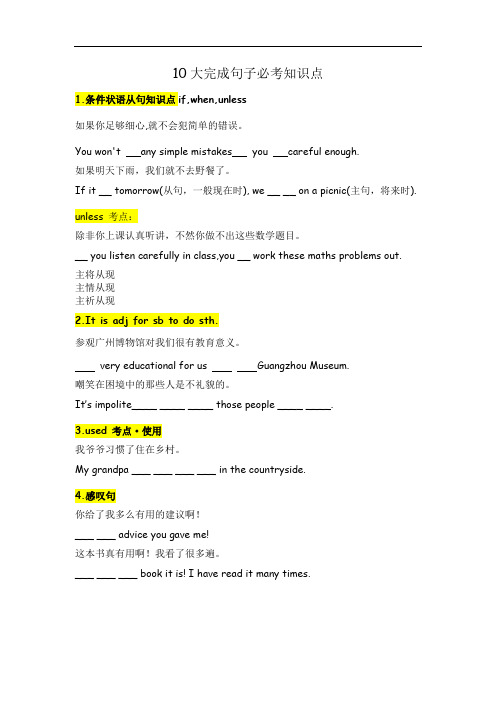
10大完成句子必考知识点1.条件状语从句知识点if,when,unless如果你足够细心,就不会犯简单的错误。
You won't any simple mistakes you careful enough.如果明天下雨,我们就不去野餐了。
If it __ tomorrow(从句,一般现在时), we __ __ on a picnic(主句,将来时). unless 考点:除非你上课认真听讲,不然你做不出这些数学题目。
__ you listen carefully in class,you __ work these maths problems out.主将从现主情从现主祈从现2.It is adj for sb to do sth.参观广州博物馆对我们很有教育意义。
very educational for us Guangzhou Museum.嘲笑在困境中的那些人是不礼貌的。
It’s impolit e____ ____ ____ those people ____ ____.ed 考点·使用我爷爷习惯了住在乡村。
My grandpa ___ ___ ___ ___ in the countryside.4.感叹句你给了我多么有用的建议啊!___ ___ advice you gave me!这本书真有用啊!我看了很多遍。
___ ___ ___ book it is! I have read it many times.5.宾语从句特殊疑问词+陈述性语气+to do sth.1.妹妹问我是否可以帮她学英语。
My sister asked me __ __ __ __ her with her English.2. 我们不知道下一步该做什么,于是请教王老师。
We didn‘t know ___ ___ ___ next. So we asked Miss Wang for help.3. 我不明白为什么他们在这个时候踢足球。
广东省英语中考知识点归纳总结
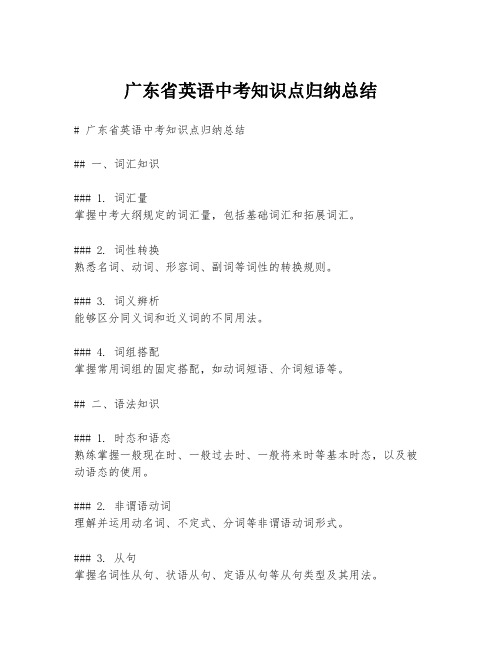
广东省英语中考知识点归纳总结# 广东省英语中考知识点归纳总结## 一、词汇知识### 1. 词汇量掌握中考大纲规定的词汇量,包括基础词汇和拓展词汇。
### 2. 词性转换熟悉名词、动词、形容词、副词等词性的转换规则。
### 3. 词义辨析能够区分同义词和近义词的不同用法。
### 4. 词组搭配掌握常用词组的固定搭配,如动词短语、介词短语等。
## 二、语法知识### 1. 时态和语态熟练掌握一般现在时、一般过去时、一般将来时等基本时态,以及被动语态的使用。
### 2. 非谓语动词理解并运用动名词、不定式、分词等非谓语动词形式。
### 3. 从句掌握名词性从句、状语从句、定语从句等从句类型及其用法。
### 4. 句型结构熟悉简单句、并列句、复合句等句型结构。
## 三、阅读理解### 1. 快速阅读培养快速捕捉文章主旨大意的能力。
### 2. 细节理解提高对文章中具体信息的捕捉和理解能力。
### 3. 推理判断学会根据文章内容进行逻辑推理和判断。
### 4. 词汇猜测掌握根据上下文猜测生词词义的技巧。
## 四、完形填空### 1. 语境分析根据上下文语境,理解文章大意,推断空格处的词义。
### 2. 逻辑关系识别文章中的逻辑关系,如因果、转折、并列等。
### 3. 固定搭配注意文章中的固定词组搭配,选择恰当的选项。
### 4. 语法知识运用语法知识,判断空格处的词性、时态等。
## 五、书面表达### 1. 写作格式掌握书信、通知、议论文等不同文体的写作格式。
### 2. 语言表达使用准确、流畅的语言表达思想。
### 3. 逻辑结构组织文章内容,使其具有清晰的逻辑结构。
### 4. 词汇运用恰当运用高级词汇和短语,提升文章表达的丰富性。
## 六、听力理解### 1. 听力技巧培养快速捕捉关键信息的听力技巧。
### 2. 细节捕捉提高对听力材料中细节信息的捕捉能力。
### 3. 语速适应适应不同语速的听力材料,提高理解速度。
广州初中英语知识点

广州初中英语知识点:必背词组1 stop doing 停下正在做的事2 stop sb from doing sth 阻止某人做某事3 stop sbfrom doing 阻止某人做某事4 stop to do 停下正在做的事去做下一件事5 such +名这样,这种6 suit sb 适合某人7 surprise sb 使某人惊奇 to one's surprise 令某人惊奇8 take classes 上课9 take sb to 把某人带去 eg : I take you to the hospital10 take walks = take a walk = go for a walk 散步11 ①talk to 对谁说② talk with 和谁说③ talk of 谈到④ talk about 谈论关于……12 talk with sb 和某人说话13 teach sb sth 教某人做某事14 tell sb do sth 告诉某人做某事15 tell sb sth 告诉某人某事 tell sb that 丛句 tell sb not to do sth16 tell sb 〔not〕 to do sth 告诉某人做什么17 tell…from… 区别18 thank you for +doing19 the same +名词doing+as……20 the same…名…as as…adj adv…as 相同21 the way to do sth = the way of doing st做某方面的方法 the way to +地方去哪的路22 e g :Do you know the way to learn English Do you know the way of learning English23 the way to…地点到哪的24 transalte ……into…… 把什么翻译成什么 eg : Trasalte English into chinese25 travel with sb和某人去旅游26 try one's best to do sth尽某人最大的努力去做某事eg: I will try my best to learn English well27 try to do sth 想干什么,但没成功 try doing sth 想干什么,已经做过了28 try…试衣服 have a try 试一下29 turn down 开小←→ turn up 开大30 turn off 关上←→ turn on 打开 open 拆开31 upside down 倒着32 visit to… 参观某个地方33 wait for sb 等某人:There be 句型一、认识there be句型There be 结构是英语中陈述事物客观存的常用句型,表示“有”,其确切含义是“存在”there 作为引导词,本身没有意义,用动词be的某些形式作为谓语动词,它的主语是用一些表示泛指或不定特指的名词词组,动词be和主语的数必须一致。
广东中考英语语法知识点-英语(米高分享)
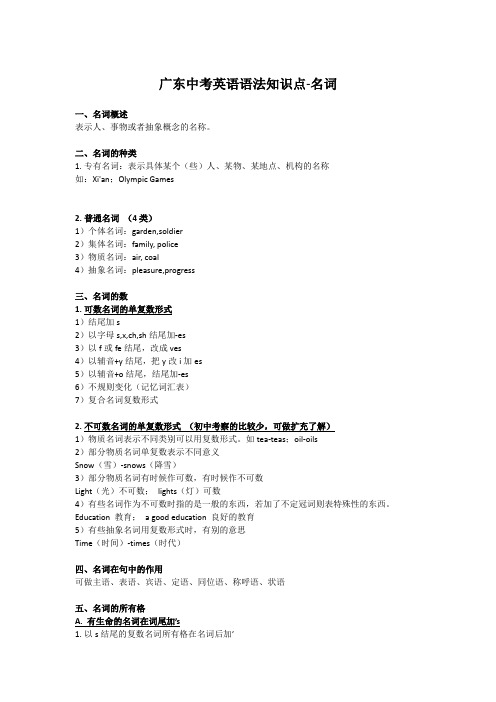
广东中考英语语法知识点-名词一、名词概述表示人、事物或者抽象概念的名称。
二、名词的种类1.专有名词:表示具体某个(些)人、某物、某地点、机构的名称如:Xi'an;Olympic Games2.普通名词(4类)1)个体名词:garden,soldier2)集体名词:family, police3)物质名词:air, coal4)抽象名词:pleasure,progress三、名词的数1.可数名词的单复数形式1)结尾加s2)以字母s,x,ch,sh结尾加-es3)以f或fe结尾,改成ves4)以辅音+y结尾,把y改i加es5)以辅音+o结尾,结尾加-es6)不规则变化(记忆词汇表)7)复合名词复数形式2.不可数名词的单复数形式(初中考察的比较少,可做扩充了解)1)物质名词表示不同类别可以用复数形式。
如tea-teas;oil-oils2)部分物质名词单复数表示不同意义Snow(雪)-snows(降雪)3)部分物质名词有时候作可数,有时候作不可数Light(光)不可数;lights(灯)可数4)有些名词作为不可数时指的是一般的东西,若加了不定冠词则表特殊性的东西。
Education 教育;a good education 良好的教育5)有些抽象名词用复数形式时,有别的意思Time(时间)-times(时代)四、名词在句中的作用可做主语、表语、宾语、定语、同位语、称呼语、状语五、名词的所有格A. 有生命的名词在词尾加’s1.以s结尾的复数名词所有格在名词后加’2.不以s结尾的复数名词的所有格加’s3.不以s结尾的复数名词所有格要加’s4.如果为两人或三人共有,在最后一个名词后加’s5.如果不是共有的,每个名词后都加’s6.表示“店铺”、“某人家”、“诊所”等时,一般省去名词所有格后的名词7.有些表示时间、距离、国家、城镇、机构的名词后也可加’s表示所有格B. 表示无生命的名词加of1. 与of构成词组,表示关系The title of the song2. 有生命的生物名词也可以用of,特别是当名词较长或者定语较长的时候The works of Marx, Engels, Lenin and Stalin3.名词所有格有时候可以和of构成短语1)修饰词前面有数量词Several students of Lao Yang’s acted in the play.2)修饰词前有指示代词That little daughter of your brother’s is very clever.。
必背句型-2024年广东中考英语考前必背必记必押题
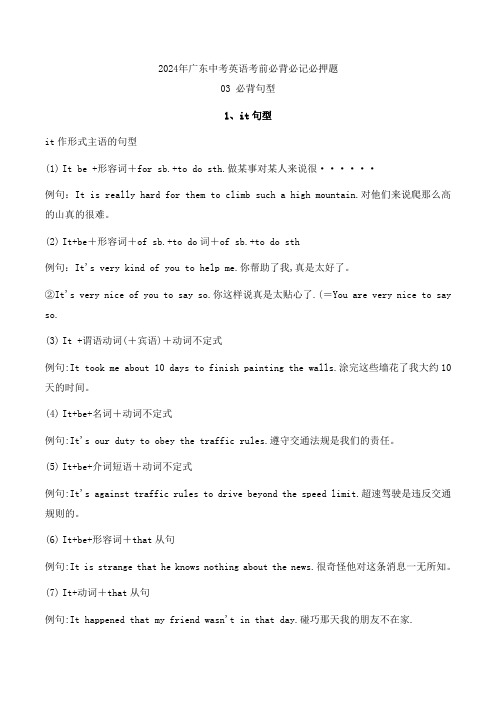
2024年广东中考英语考前必背必记必押题03 必背句型1、it句型it作形式主语的句型(1)It be +形容词+for sb.+to do sth.做某事对某人来说很······例句:It is really hard for them to climb such a high mountain.对他们来说爬那么高的山真的很难。
(2)It+be+形容词+of sb.+to do词+of sb.+to do sth例句:It's very kind of you to help me.你帮助了我,真是太好了。
②It's very nice of you to say so.你这样说真是太贴心了.(=You are very nice to say so.(3)It +谓语动词(+宾语)+动词不定式例句:It took me about 10 days to finish painting the walls.涂完这些墙花了我大约10天的时间。
(4)It+be+名词+动词不定式例句:It's our duty to obey the traffic rules.遵守交通法规是我们的责任。
(5)It+be+介词短语+动词不定式例句:It's against traffic rules to drive beyond the speed limit.超速驾驶是违反交通规则的。
(6)It+be+形容词+that从句例句:It is strange that he knows nothing about the news.很奇怪他对这条消息一无所知。
(7)It+动词+that从句例句:It happened that my friend wasn't in that day.碰巧那天我的朋友不在家.(8)It +be+过去分词+that 从句例句 :It was reported that China has built nearly 700,000 5G base stations.据报道中国已经建立了近70万5G基站。
广州中考单项选择语法知识点

⼴州中考单项选择语法知识点冠词:定冠词the 特指,前⽂中已经提到,后⽂再提到⽤thePlay the piano不定冠词a,an a ⽤于辅⾳发⾳的单词之前an⽤于元⾳发⾳的单词之前an honest boy an houra university a uniform an uncle零冠词for breakfast /lunch/dinner play basketball /footballBy bus/car=take a car16. He took ________ taxi to the airport and hurried to Beijing for a meeting by ________ plane.A. 不填, 不填B. a, theC. a; 不填D. the, 不填16. —Do you have ________key to the blue car?—I think ________ key is on the table.A. the, theB. the; /C. /; theD. a; a16. ---Do you believe _______ news they told you last night?---Of course not. It can’t be true.A. aB. anC. theD. 不填18. I usually have ________ egg and a glass of milk for _________ breakfast.A. an; theB. a; theC. a; 不填D. an; 不填连词:A,常见的表⽰语义引申的并列连词有:1.and2. neither... nor3.both... and4. not only... but alsoB,表⽰选择的并列连词有:1. or2. either... orC,表⽰转折或对⽐的并列连词有:1. butD,表⽰因果关系的并列连词有:1. so从属连词是⽤来引导从句的。
广东广州中考英语常用语法知识——宾语从句经典复习题(课后培优)
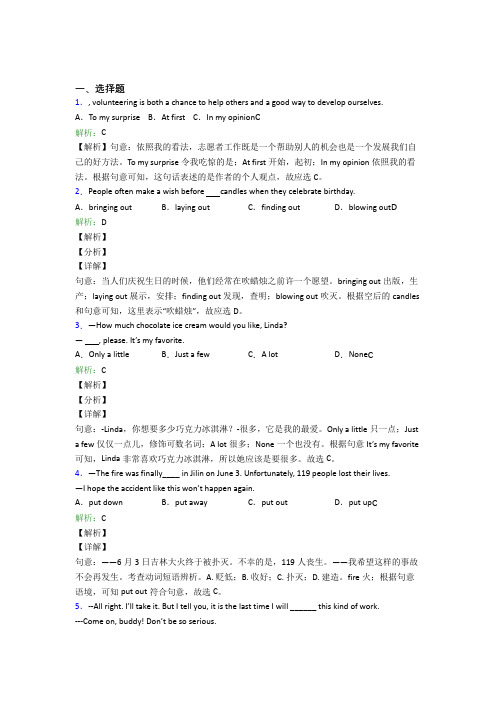
一、选择题1., volunteering is both a chance to help others and a good way to develop ourselves.A.To my surprise B.At first C.In my opinion C解析:C【解析】句意:依照我的看法,志愿者工作既是一个帮助别人的机会也是一个发展我们自己的好方法。
To my surprise令我吃惊的是;At first开始,起初;In my opinion依照我的看法。
根据句意可知,这句话表述的是作者的个人观点,故应选C。
2.People often make a wish before candles when they celebrate birthday.A.bringing out B.laying out C.finding out D.blowing out D解析:D【解析】【分析】【详解】句意:当人们庆祝生日的时候,他们经常在吹蜡烛之前许一个愿望。
bringing out出版,生产;laying out展示,安排;finding out发现,查明;blowing out吹灭。
根据空后的candles 和句意可知,这里表示“吹蜡烛”,故应选D。
3.—How much chocolate ice cream would you like, Linda?—, please. It’s my favorite.A.Only a little B.Just a few C.A lot D.None C解析:C【解析】【分析】【详解】句意:-Linda,你想要多少巧克力冰淇淋?-很多,它是我的最爱。
Only a little只一点;Just a few仅仅一点儿,修饰可数名词;A lot很多;None一个也没有。
根据句意It’s my favorite 可知,Linda非常喜欢巧克力冰淇淋,所以她应该是要很多。
(完整word版)广州初中英语考点总结,文档

初中英语·语法重点难点一、冠词1、不定冠词 a/an 的差异2、定冠词 the 的用法3、“/ 〞零冠词的用法4、与冠词相关的固定搭配二、时态1、一般现在时的的理解与运用,特别是第三人称单数的运用2、一般将来时的理解与运用〔will+动词原形与 be going to +动词原形的差异〕3、一般过去时的理解与运用〔不规那么动词过去式的掌握〕4、现在进行时的理解与运用三、词性1、可数名词与不可以数名词的掌握2、形容词的用法3、代词的用法〔掌握人称代词的人称数与格;物主代词的用法;反身代词的用法〕初一4、量词掌握 many 与 much 的差异: how much 与 how many 的差异; a few/few, a little/little的差异;5、神情动词的用法掌握 can/could; may/might; must/have to的差异6、连词掌握 and /so /but/however的运用四、句型1.掌握特别疑问句的构成2.掌握 There be 句型的用法〔就近原那么〕3.It is +形容词 +to do sthed to +动词原形 /did not use to5.祈使句〔必定的祈使句/ 否认的祈使句〕五、从句If 引导的条件状语从句一、词性1、 some 与 any 的用法复合不定代词的用法〔复合不定代词作主语时,谓语动词用单数;形容词修饰不定代词时,形容词放在不定代词此后〕2、 Both/neither/either/all/none/any的差异3、基数词与序数词的用法4、分数的表达5、形容词与副词的比较级与最高等〔不规那么形容词与副词的比较级与最高等的记忆〕二、不定式的用法1、不定式作主语2、不定式作目的状语3、不定式作宾语补足语4、特别疑问词 +不定式三、动名词1、动名次作主语,谓语动词用单数2、介词 +v-ing3、常有的词组 look forward to+doing四、时态掌握现在完成时的用法1、 already、 yet 、ever、 never 常用于现在完成时初二2、刹时动词与连续性动词的变换3、 Have been in /have been to /have gone to 的差异4、 Since 与 for 的差异五、语态掌握被动语态1、一般现在时的被动语态2、一般过去时的被动语态3、一般将来时的被动语态4、现在完成时的被动语态5、含有神情动词的被动语态六、从句1、 if/unless 引导的条件状语从句2、原因状语从句〔because/since/as 的差异; because of /because 的差异〕七、特别句式及固定搭配1、 It is +adj (of/for sb )to do sth2、 Too to.3、 ..adj enough to do sth4、 So .that.5、 should +动词原形6、 had better +动词原形一、句式反意疑问句的三种结构:结构一:必定的陈述句+ 否认的简短问句结构二:否认的陈述句+ 必定的简短问句结构三:祈使句+ 简短问句二、 Infinitive 〔动词不定式〕的用法复习1.作主语2.作宾语3.作宾语补足语4.作定语5.表语三、动名词的用法复习1、动名次作主语,谓语动词用单数2、介词 +v-ing3、常有的词组 look forward to+doing四、系动词〔 linking Verb〕1.状态系动词2.连续系动词3.表象系动词4.感官系动词5.变化系动词6.停止系动词初三五、简单句的五种根本句型1.S + Vi.主语 +不及物动词2.S + Vt. + O主语 +及物动词 +宾语3.S+V.+C4.主语 + S + Vt. + IO + O主语 +及物动词 +间接宾语 +直接宾语系动词 +表语5. S + Vt. + O + OC主语 +及物动词 +宾语 +宾语补足语Though 和 although 用法区分六、定语从句1.关系代词 who/which/that的用法2.简单关系副词在定语从句中的运用七、宾语从句的复习1.语序问题2.时态问题八、感想句的复习1.由 what 引导的感想句2.由 how 引导的感想句九、被动语态的复习1.一般现在时的被动语态2.一般过去时的被动语态3.般将来时的被动语态4.现在完成时的被动语态5.含有神情动词的被动语态十、形容词与副词的比较级与最高等1.规那么形容词与副词比较级与最高等的变化规那么2.不规那么形容词与副词比较级与最高等的变化3.固定的结构〔 eg.比较级 and 比较级 ;the+比较级., the+比较级〕十一、复习冠词5、不定冠词 a/an 的差异6、定冠词 the 的用法7、“/ 〞零冠词的用法8、与冠词相关的固定搭配。
广州市初中英语解题技巧训练--语法选择
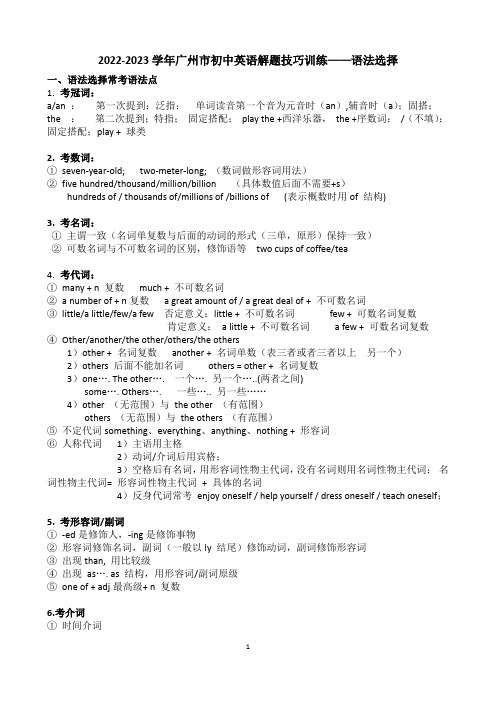
2022-2023学年广州市初中英语解题技巧训练——语法选择一、语法选择常考语法点1.考冠词:a/an :第一次提到;泛指;单词读音第一个音为元音时(an),辅音时(a);固搭;the :第二次提到;特指;固定搭配;play the +西洋乐器,the +序数词;/(不填):固定搭配;play + 球类2.考数词:①seven-year-old; two-meter-long; (数词做形容词用法)②five hundred/thousand/million/billion (具体数值后面不需要+s)hundreds of / thousands of/millions of /billions of (表示概数时用of 结构)3.考名词:①主谓一致(名词单复数与后面的动词的形式(三单,原形)保持一致)②可数名词与不可数名词的区别,修饰语等two cups of coffee/tea4.考代词:①many + n 复数much + 不可数名词② a number of + n复数 a great amount of / a great deal of + 不可数名词③little/a little/few/a few 否定意义:little + 不可数名词few + 可数名词复数肯定意义: a little + 不可数名词 a few + 可数名词复数④Other/another/the other/others/the others1)other + 名词复数another + 名词单数(表三者或者三者以上另一个)2)others 后面不能加名词others = other + 名词复数3)one…. The other…. 一个…. 另一个…..(两者之间)some…. Others…. 一些….. 另一些……4)other (无范围)与the other (有范围)others (无范围)与the others (有范围)⑤不定代词something、everything、anything、nothing + 形容词⑥人称代词1)主语用主格2)动词/介词后用宾格;3)空格后有名词,用形容词性物主代词,没有名词则用名词性物主代词;名词性物主代词= 形容词性物主代词+ 具体的名词4)反身代词常考enjoy oneself / help yourself / dress oneself / teach oneself;5. 考形容词/副词①-ed是修饰人,-ing是修饰事物②形容词修饰名词,副词(一般以ly 结尾)修饰动词,副词修饰形容词③出现than, 用比较级④出现as…. as 结构,用形容词/副词原级⑤one of + adj最高级+ n 复数6.考介词①时间介词at: 用于具体时刻、节日前,例如:at 8:00,at Christmas. 固定搭配:at noon, at night in: 用于世纪、年、季节、月份等不具体的时间前,例如:in 2011固定搭配:in the morning/afternoon/eveningon: 用于具体的某一天,或具体的早上、下午、晚上; 星期。
初三粤教版必备英语掌握讲义

初三粤教版必备英语掌握讲义一、语法知识点掌握在初三英语学习中,掌握语法知识是非常重要的。
以下将介绍几个必备的语法知识点,供同学们参考。
1. 时态- 现在时态:表示现在正在进行的动作或状态。
I am studying English at the moment.- 过去时态:表示过去发生的动作或状态。
He played soccer yesterday.- 将来时态:表示将来要发生的动作或状态。
We will go to the beach next weekend.2. 从句- 定语从句:用来修饰名词或代词。
The book that I bought yesterday is very interesting.- 宾语从句:用来作及物动词或介词的宾语。
She asked me if I could help her with the project.- 状语从句:用来作句子的状语。
I will go swimming after I finish my homework.3. 被动语态被动语态用于强调动作的接受者,结构为"be + 过去分词"。
- 主动语态:He cleans the room every day.- 被动语态:The room is cleaned every day by him.二、听力技巧1. 注意关键词在听力过程中,要注意关键词的出现。
关键词通常会出现在问题中,并且和答案相关。
通过抓住关键词,可以更快地找到正确答案。
2. 推断上下文有时,在听力中会出现一些较难的词或短语,这时可以通过上下文的暗示来推断出其含义。
尤其是在情境对话中,可以根据对话的背景和角色关系来推测出其中的隐含信息。
三、阅读技巧1. 首先阅读题目和选项在阅读理解题中,首先要阅读题目和选项,确保自己清楚题目要求和选项中的关键词,这样在阅读文章时可以有针对性地寻找答案。
2. 关注段落结构阅读时要注意段落结构,每一段都会有一个主题句,通常会在文章的开头或结尾出现。
广州中考英语之完成句子篇(满分干货)
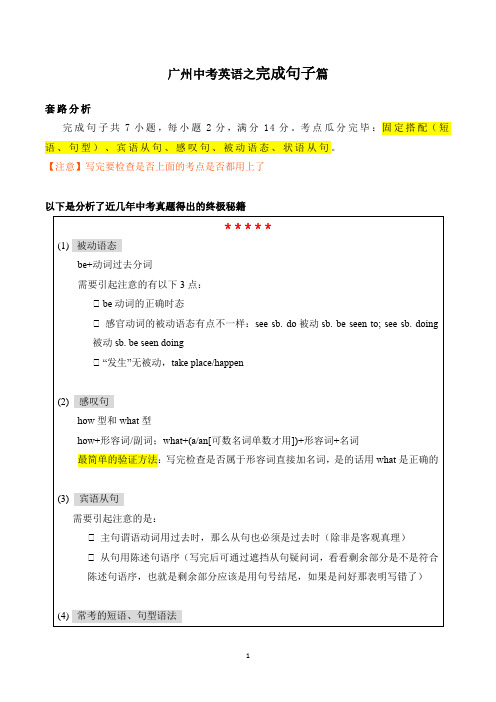
广州中考英语之完成句子篇套路分析完成句子共7小题,每小题2分,满分14分。
考点瓜分完毕:固定搭配(短语、句型)、宾语从句、感叹句、被动语态、状语从句。
【注意】写完要检查是否上面的考点是否都用上了以下是分析了近几年中考真题得出的终极秘籍2019年广州中考真题57.他正在考虑是否能参加足球俱乐部。
He is think about __________ __________ __________ join the football club.58.我们还没有决定什么时候探望爷爷奶奶。
We haven’t decided __________ __________ __________ our grandparents.59.我们离开课室的时候必须关灯。
Lights _________ _________ _________ _________ when we leave the classroom.60.校长做的讲座多么精彩啊。
__________ __________ the head teacher's talk was!61.迈克一放学回家就开始做饭。
Mike started cooking __________ __________ __________ he got home from school. 62.孩子们总是盼望着春节。
Children always __________ __________ __________ the Spring festival63.在图书馆内,我们既不应该吃东西也不应该交谈。
We should __________ eat __________ talk in the library.答案:57. if/whether he can58. when to visit59. must be turned off60. how wonderful61. as soon as62. look forward to63. neither; nor2018年广州中考真题57.你沿丝绸之路旅游过吗?__________ __________ ever _________ along the Silk Road?58.参观广州博物馆对我们很有教育意义。
广东中考英语语法规则讲解

广东中考英语语法规则讲解英语语法在广东中考中占据重要地位,掌握基本的语法规则对于考生来说至关重要。
本文将为广东中考考生介绍几个常见的语法规则。
1. 时态时态是英语语法中重要的方面之一。
以下是一些常见的时态规则:- 一般现在时:表示经常性动作、客观事实和普遍真理。
例如:"I go to school every day."- 一般过去时:表示过去发生的动作或状态。
例如:"She watched a movie yesterday."- 完成时态:表示过去发生的动作对当前产生的影响。
例如:"I have finished my homework."2. 句子结构句子结构在英语语法中也非常重要。
以下是一些常见的句子结构规则:- 主谓结构:包括一个主语和一个动词。
例如:"Tom runsevery morning."- 主谓宾结构:包括一个主语、一个动词和一个宾语。
例如:"She eats an apple."- 主系表结构:包括一个主语、一个系动词和一个表语。
例如:"He is a student."3. 名词名词是英语中的一类词性,用来表示人、物、地点等。
以下是一些名词的常见规则:- 可数名词:可以用来表示数量。
例如:"I have three apples."- 不可数名词:无法用来表示数量,通常用来表示抽象概念或物质。
例如:"I need some water."以上是广东中考英语语法的简要介绍。
考生们应该通过练和不断的积累来掌握这些基本规则,并在考试中正确运用。
希望这份文档能帮助到考生们。
> 注意:本文所述内容来源于常见的英语语法规则,在写作时请遵循官方教材为准。
- 1、下载文档前请自行甄别文档内容的完整性,平台不提供额外的编辑、内容补充、找答案等附加服务。
- 2、"仅部分预览"的文档,不可在线预览部分如存在完整性等问题,可反馈申请退款(可完整预览的文档不适用该条件!)。
- 3、如文档侵犯您的权益,请联系客服反馈,我们会尽快为您处理(人工客服工作时间:9:00-18:30)。
广州中考英语必考语法中考语法考查必考语法点之一是被动语态。
这种考查形式会出现在语选、完形和完成句子题型中,尤其是完成句子。
考察难度不高,因为被考查的动词都是比较简单、拼写不会超过5个字母的单词,过去分词一般都是直接+ed出现。
考生需要掌握被动语态的判断、被动语态的结构和动词过去分词的正确拼写。
要点归纳如下:首先,主语不能发出对应的动作。
主语是没有生命的东西,一定是被动语态。
如果主语是人,则从意识上去判断该动作是不是该主语发出的。
其次,被动语态的结构是be+过去分词+(by+动作执行者)。
掌握的几种形式包括:一般现在时的被动语态、一般过去时的被动语态、现在完成时的被动语态、一般将来时的被动语态和含有情态动词的被动语态。
此外,感官动词或使役动词使用省略to的不定式,主动语态中不带to,但变为被动语态时,须加上to。
例如,make sb do sth = sb +be+made + to do sth。
最后,被动语态常考的固定搭配有Be made of、Be made from、Be made in、Be used for 和Be used to do。
需要注意的是,有些短语和动词有“被动形式”,但没有被动的意思,例如be used to doing(惯于做事)和Used to do sth(过去/曾经做某事)等。
According to Grandma's n。
the soup should be cooked for more than two hours.Intransitive verbs that do not take passive voice are often tested。
such as happen。
take place。
begin。
start。
end。
belong to。
and come true。
Active verbs that can express passive voice include sell。
wash。
write。
as well as feel。
smell。
look。
taste。
and sound.XXX 1:XXX XXX.When it was time for the villagers to go to market。
they were greatly surprised to find that the man'XXX.They were greatly surprised to find that the man'XXX.XXX 2:With the help of the Chinese people。
a new and modern railway in Kenya was built several months ago.The project will be XXX。
using the XXX.Note: This document contains content from the。
please inform us if there is any infringement and we will delete it。
You are free to edit and modify the content of this document。
Thank you for your support.According to Grandma's n。
the soup should be cooked for more than two hours.XXX at this time。
(改写句子)The soup should be cooked for more than two hours according to Grandma。
(改写句子)Next month。
many trees will be planted in our school to make it more beautiful。
(改写句子)宾语从句是用一个句子来充当另一个句子的宾语成分,需要注意陈述语序、时态和连接词等三要素。
连接词包括that。
whether(……or not)。
if。
what。
who。
which。
whose。
when。
where等。
当主句和从句的主语为同一人时,从句可以简化为疑问词+不定式。
(改写段落)XXX "Now you heard your mother said。
e" used "that" to introduce the object clause。
(改写句子)She didn't know how to play it。
so she decided to have a try。
She played and played the whole day through for months and years。
The music she produced was never perfect。
but each time it sounded a little better。
(改写段落)XXX at this time。
(改写句子)XXX's grandma was a woman who was XXX。
例题二:I wonder if he can get to school on time。
例题三:XXX to go to Beijing。
but we haven't decided when to go。
定语从句是用一个从句来修饰另一个句子的名词或代词。
关系代词有that。
which。
who,关系副词有where。
when。
记忆诀窍是从句完整则用when/where,不完整则用which/that。
注意,that引导的定语从句在从句中充当宾语可以省略,而非限制定语从句是用逗号隔开的定语从句。
One year。
a young man received his share of potatoes.XXX.In online shopping。
the book you ordered will be delivered to your home after three days.The difficulty level of testing is mainly focused on the use of ns rather than tense.The key points to note are the use of "when" and "while" in time clauses。
"as soon as" for immediate ns。
"not。
until" fordelayed ns。
"if" and "unless" for nal clauses。
"so。
that" for consequences。
"so that" for purposes。
and "because" for reasons.His father was a farmer。
XXX on the farm。
where there were never any children to play with.1.XXX the harp back to the palace。
but when he tried to play it。
the sound was terrible。
(改写句子,去掉错误的标点符号)2.XXX the offer。
but Patty reassured her that she was willing to help。
and they began their journey to the operating table。
(改写句子,修正语法错误)3.If we continue to produce too much rubbish。
the problem will only worsen。
If nature cannot reuse the rubbish。
(改写句子,修正标点符号和语法错误)句子改写后:1.XXX the harp back to the palace。
but the sound was terrible when he tried to play it.2.XXX the offer。
but Patty assured her that she was willingto help。
and they started their journey to the operating table.3.If we keep producing too much rubbish。
the problem will only get worse。
If XXX。
How busy Xiao Mei is。
She always arrives first and leaves last.What a useful book it is。
I have read it many times.What a boring movie it was。
XXX.You’ve XXX!常考语法点之一:动词动词是词法的核心,考查范围较大,难度较大。
时态要点归纳:主将从现(在状语从句已经提到)。
现在完成时的4大用法:结果、延续、经历、移位。
时间标志包括:for + 时间段、since + 时间点/一般过去时的句子、already、yet、every、never、“How long…?”、含有“time”表示次数的句子。
区分:have been to + 地点:曾经去过某地。
have gone to + 地点:已经到某地去了。
have been in + 地点 + for + 时间段。
瞬间动词与延续性动词间的转换:die – be deadbuy – haveborrow – keepleave/go – be away(from)make friends – be friendsbegin/start – be onRewritten:1.Don't et to take good care of Grandma when you leave。
(using "take" instead of "good care" as a noun)2.XXX on her chair by the window。
